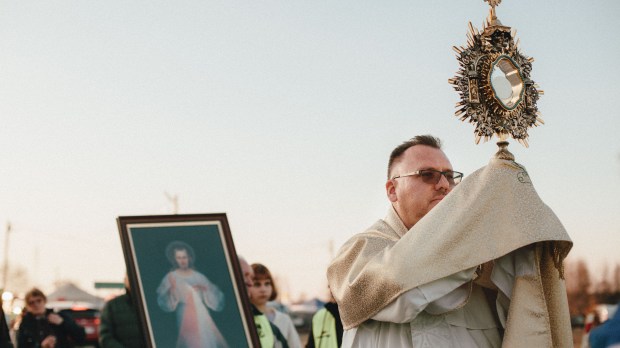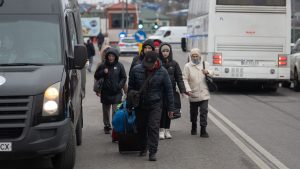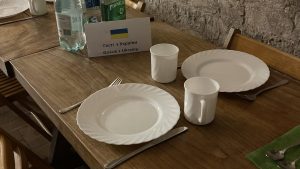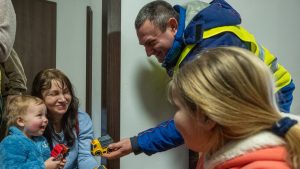Fr. Jonathan Kalisch and Fr. Patrick Mary Briscoe, Editor-in-Chief of the English-language edition of Aleteia, spent several weeks serving as priests at the Polish-Ukrainian border. They assisted by celebrating holy Masses, working, often from morning until late evening, in Mercy Centers (in Hrebenne and Budomierz) and in tents with humanitarian and medical aid, which were set up by the Polish Knights of Columbus in cooperation with the American Knights of Columbus.
Aleteia’s Polish edition interviewed Fr. Jonathan, Director of Chaplains and Spiritual Development, Knights of Columbus for this report:
Father, thank you for coming to the Polish-Ukrainian border to assist the victims of the war. What prompted you to come to Poland so soon after the outbreak of the war?
Fr. Jonathan: I began ministry with the Knights of Columbus in 2013, and from the beginning worked closely with our Polish and Ukrainian brother Knights: first to plan the participation of pilgrims during the canonization of St. John Paul II, where the Knights hosted over 2,000 pilgrims at soccer fields in Rome; then working with the Polish Knights to host over 100,000 English-speaking pilgrims at the Tauron Arena Krakow during the WYD 2016. I have made numerous trips to Poland over the past nine years and visited our brother Knights in Ukraine in 2019. So these years of close cooperation and assistance built lasting relationships.
When the war began, it was obvious to me that I would do all I could to assist in whatever way possible the refugees. In the face of such evil, no one can be indifferent. The words and witness of Solidarity of Bl. Jerszy Popielusko and St. John Paul II ring out: “overcome evil with good,” and “bear one another’s burdens.”
When Supreme Knight Patrick Kelly announced the Urkaine Solidarity Assistance Fund to raise money and donate humanitarian goods to the people of Ukraine and war refugees, I sought to help raise awareness of the situation, the needs of the refugees, and the generous response of the people of Poland by coming over to assist.
What touched you the most, here in Poland, on the border with war-torn Ukraine?
Seeing mothers with children and the elderly fleeing the war as they cross the border. I remember seeing one car pull over and the driver exhausted with emotion, crying and shaking her fist in joy that they had made it across safely. Right behind was another car with a mother visibily searching documents of who to call and where to go next. There was an elderly couple on walkers who sat down at the Mercy Center and pulled out notes with handwritten Polish numbers of who to call. At another moment, a whole village came across together – practically all women, old and young along with children. Then there were four teenagers who had traveled alone from Kyiv and met along the way. They were now each other’s only companions.
On my first night at the border, I met Sophia who was dancing in the cold, going up and slapping hands with volunteers. Her father had to say goodbye to her at the border, along with her sister, brother, and mother who stood nearby. They told me she had just turned five years old a few days before, as they were fleeing. Her mother allowed me to pick up Sofia and hold her high above everyone. I gave her the only thing I had in my pocket – a small Rosary – as a birthday gift. For me, she is the face of the refugees fleeing war.
We assisted in transporting refugees from border receiving points to Krakow. There were two mothers with three children, girls who were twins aged 7 and another girl aged 5. They had just left their husbands who had driven them to the border for four days. Now they were refugees with only one suitcase each. Luckily for them they had some family who had previously come to Poland with whom they could stay for a short time.
I must also mention the extraordinary solidarity and mercy shown by Poles to the victims of the war in Ukraine. I can tell you about many examples of selfless help flowing from the heart. It is also striking that there are no refugee camps because Poles take refugees directly into their homes, parishes or religious communities. They remember the proverb that “a guest in the house is God in the house.” There are a lot of people of good will on the border here, including international volunteers who work with great dedication from morning to evening and for them it is clear that we share what we have, not only medical or humanitarian help, but also a good word, smile or a cordial gesture.
Father, you came to Poland together with Fr. Patrick Mary Briscoe, Editor-in-Chief of Aleteia’s English edition.
Yes. I have worked closely with Patrick for over 10 years, including during the WYD Krakow 2016, and so it was natural for him to come here to the border – despite the war – to a medical and humanitarian center to help refugees from the war in Ukraine. And also to report “live” from the border on the true plight of the refugees. Fr. Patrick works closely with young adults giving retreats, and leading podcasts. When he saw in the news what was happening with children who were fleeing with their mothers to the border with Poland, he decided that he wanted to come here to show the world the truth about the cruel face of the war as a journalist. And also to show American young adults the ways in which they can help their Ukrainian peers, so as not to be indifferent. Fr. Patrick prepared videos to cover everything that was happening on the Polish-Ukrainian border, what the daily humanitarian aid and spiritual help looked like. We posted these videos together on social media and received a great response from many young Americans. They asked us: how can I help? Naturally, the most important thing is prayer, as well as financial support, for example for food or medical help.
Father, your surname Kalisch (or Kalisz), sounds very familiar to us in the homeland of John Paul II.
Yes, it’s true, my great-grandparents were Poles and I have gone on pilgrimage to the Saint Józef Shrine in Kalisz. We should remember that among the new titles of St. Joseph given during the year of St. Joseph, is patron of refugees. In my own life, it was while living and working in Warsaw in 1994-1995 for PriceWaterhouseCoopers that I discovered God’s call to become a priest. I met the Dominicans in Krakow, praying at the tomb of St. Jacek. Providentially, 2022 is the 800th anniversary of the establishment of the Dominicans in Poland, and it was St. Jacek who evangelized today’s Ukraine, founding convents as far as Kyiv. When we go to the border, I also ask for his intercession, as protector of the Eucharist and the Blessed Mother. And so we pray that those staying in Poland will soon be reunited with their families, but will also experience the loving protection of the saints of Poland.
On March 25, you joined in celebrating the Holy Mass – on the border of Budomierz – for the consecration of Russia and Ukraine into the Immaculate Heart of Mary. What was the ceremony like and how did you manage to do it when the sounds of war were heard nearby?
It was a tremendous privilege to participate in the Consecration of Ukraine and Russia to the Immaculate Heart of Mary on Friday – at the Budomierz border crossing! Ours was the only Mass at the border that I am aware of that day. The Sisters of Our Lady of Mercy from Krakow (two of whom take turns staying at the border and serving the refugees) led the Divine Mercy Chaplet. The local Pastor Fr. Andreij from Lubaczow celebrated the Mass and offered the Polish Consecration Prayers.
Following Mass, we had Adoration of the Blessed Sacrament and the Sisters led us in the Way of the Cross. Afterwards, a little past 5 pm, we began a Eucharistic Procession to the border. Saints John Paul II and Faustina were present in their relics which were carried along with icons given from the local Greek Catholic Church. The Polish border guards and officials allowed us to process to the border with the Lord Jesus in the Monstrance as we prayed the Rosary. The Pastor had provided speakers and a sound system so that all around could join us in the prayers. I blessed the border carrying our Lord and we made our way to the field between the countries where we could pray longer. There was a second outdoor altar, like you might see at Corpus Christi. This was located at the end of the “tent city” of the humanitarian border tents. (We chose this particular border crossing because of its relatively smaller size, not wanting to take away from serving the refugees who may have been coming across at that time, but also recognizing that the Holy Father Pope Francis has asked the whole world to unite in prayer at that very moment for peace). We finished the Rosary in Polish and Ukrainian at the second altar and then our Greek Catholic seminarian Taras led us in the Moleben Prayers/Hymn to the Mother of God. Following this, I sang the English prayer of Consecration and then again gave the benediction towards Ukraine and Russia. We processed back to the Mercy Center chapel for a final benediction and prayers as the 6 pm Angelus bells could be heard from the nearby village churches. The international volunteers present (German EMS workers, French fire brigades, etc.) as well as several refugees who were there at the time all stopped and respectfully watched as we went by.
For me this was a powerful moment I will long remember. We were able to breathe with both lungs using the patrimony of the Latin and Greek Catholic Churches. We carried our Lord Jesus to the border and begged the intercession of the Blessed Mother. Very poignant for me was the moment I prayed these lines from the Act of Consecration Prayer: “O Mother… may the tears you shed for us make this valley parched by our hatred blossom anew…May your maternal touch sooth those who suffer and flee from the rain of bombs. May your motherly embrace comfort those forced to leave their homes and their native land. May your Sorrowful Heart move us to compassion and inspire us to open our doors and to care for our brothers and sisters who are injured and cast aside.” We joined our prayers with millions around the world but were praying also that in this particular valley – Budomiesz – and all crossings like it, the refugees who come and will come – will receive the hope, healing, be reunited with their loved ones and soon enjoy a just peace. The Gospel is being lived out in the most tangible way today at the border between Ukraine and Poland. Let’s continue to support our brothers and sisters in this effort. Vivat Jesus!




